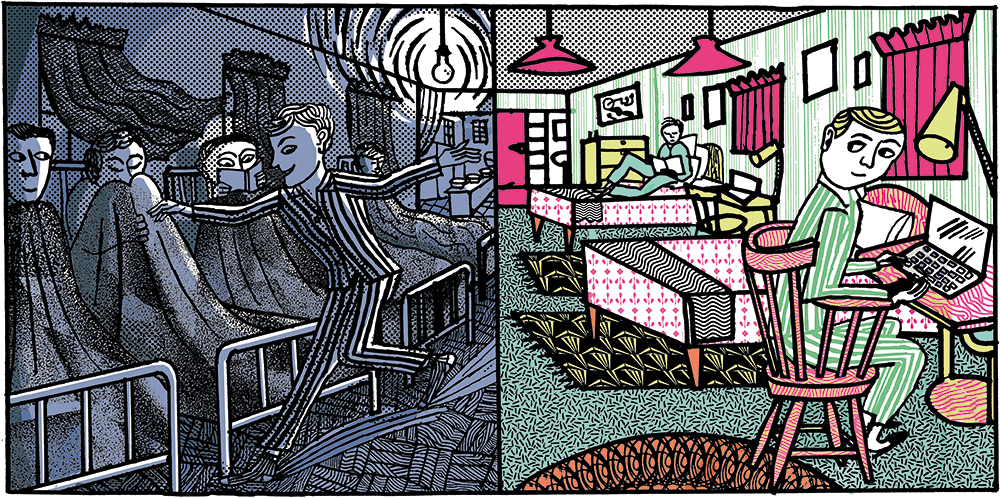Early in his time at Eton College, 13-year-old William Waldegrave, the school’s future provost, was struggling to sleep. He told his dame, and she in turn told the housemaster, John ‘A.J.’ Marsden. The former commando in charge of the boys told Waldegrave that if it happened again, he should knock on his door. A few nights later, the boy did as he was told. Marsden had a solution – they would go for a run, to Bray, seven miles from Eton. Waldegrave slept better that night.
Tales of public schools past are legion – some better than fiction, and plenty that have inspired it. Others are less appealing, more appalling. In recent years, memoirs depicting the misery of former boarders’ experiences at school have told tales of neglect and criminality. And yet, despite increased economic pressures, boarding numbers remain buoyant: according to the Independent Schools Council, there are 63,035 boarders nationwide, only a modest reduction from the 68,255 of 20 years prior. What is it about the boarding school? How has a sector for which Tom Brown’s Schooldays has apparently long prevailed as a set text survived?
Out have gone the Old Etonians who return immediately after university to serve for 50 years
The conclusion I reached, having conducted a comprehensive study of the upper class’s relationship with public schools for my book Heirs and Graces, is that far from becoming stagnant, the whole boarding sector has professionalised. No stone has been left unturned by school leaders – and rightly so. These changes can be seen in any aspect of school life that you care to consider. For a start, admissions have been overhauled. Eton housemasters in the 1980s were tasked with assessing which infant boys mewling in their parents’ arms were suitable for entry 13 years hence. Today, more enlightened admissions systems are in place – and thank goodness: when Barnaby Lenon began as headmaster of Harrow School in 1999, he found that, with no centralised admissions system, boys would turn up at school for the first time without anyone really knowing they were coming.
During his career, the two chief antagonists of the classic boarding misery memoir – corporal punishment and fagging – have been abolished too. And the schools in which they took place are in other ways unrecognisable. Since 1971, five of the seven original boys’ public schools – as defined by the Public Schools Act 1868 – have become at least partly co-educational. The introduction of girls, and in general a more grown-up approach, has seen the disappearance of ‘boy government’, an idea so previously prized that, while giving evidence to the Clarendon Commission in 1864, Harrow headmaster Henry Butler described how ‘no great school could long live in a healthy state without it’.
Today’s system is ‘much more of a collective effort from adults’, says John Moule, warden – headmaster – of Radley College. ‘Boys are still a part of it but there’s much less hierarchy.’
Talking of adults, there are just many more of them – and they are (usually) more conventional. Out have gone the Old Etonians who return immediately after university to their old school, ready to serve for the next 50 years. Nor is it possible to ascend the ranks of a school without much experience.
In 1956, the Eton housemaster Michael Birley became headmaster of Eastbourne College, where he introduced girls, with only eight years’ teaching under his belt. Such a career path was still in evidence in 2000, when the classicist Stephen Spurr left his Eton boarding house for the headship of Clifton College.
Today, that ‘well-trodden path’, as Alastair Chirnside, warden of St Edward’s School, Oxford, puts it, has been diverted towards professional development and a range of opportunities within senior leadership. Chirnside started as a boy at Eton in 1989 and, after a career as a fund manager, returned to his old school to teach classics in 2004 and became a housemaster, before moving to Harrow in 2016 to become director of studies and then its deputy head, taking over at ‘Teddies’ in 2021. ‘Schools have become much more complicated to run,’ he says. ‘I run Teddies much better than if I hadn’t been director of studies and the senior deputy at Harrow.’
If the loss of ‘boy government’ has made schools more emotionally palatable, they are now also more comfortable too. The dormitories of Enid Blyton fame have largely been swept away in favour of multi-million-pound refurbishment jobs. At Roedean School in East Sussex, a £9 million renovation in 2015 transformed boarding houses from those with bathrooms split into cubicles by plastic sheets to those with Ercol chairs and William Morris wallpaper in the common areas. Facilities have expanded, partly because of demand but also because the school was in a so-called ‘arms race’, in which Brighton College took part when its £55 million sports and science centre opened in 2020.
‘If you had lino on the floor now you’d be called Dickensian, but it was normal back then’
But home comforts are all relative. Simon Barber, headmaster of Ludgrove School – the last all-boys, all-boarding prep school in the country – remembers how ‘we used to love putting our towels on the lino and surfing down the corridor. If you had lino on the floor now you’d be called Dickensian, but it was normal then’.
Similar levels of perfect acceptability could be found in girls’ schools too. ‘Our old girls from the 1970s and 1980s talk with fondness about there being ice on the inside of the windows,’ says Emma McKendrick, headmistress of Downe House School, near Newbury. Musing over Barber’s lino memories, she adds: ‘Those boys didn’t mind lino at school probably because there weren’t plush carpets at home – it reflected the time.’
As all schools should. Independent schools have long had to acquiesce to their market and today that means better pastoral care, tighter regulation and a more inclusive culture. ‘Rather than treating boys and girls as a group, it’s much more about the individual,’ says Moule. And children’s success is measured differently. A KC with two children away at school remembers how at their prep school: ‘The housemaster told me that to be recognised in the school hierarchy, the children had to exhibit kindness. I remember thinking, “Christ, that’s 180 degrees from my own experience at school.” It’s all significantly child-centred now.’

With the focus on the child, parents and schools are better aligned. Lenon was at Eton for 12 years before he moved to Harrow, and in that time he didn’t meet a single parent. ‘They were regarded as a nuisance,’ he says. ‘Now they are regarded as partners. That’s a big change – working with parents, enjoying their company, and parents being more involved in the life of their children.’
There are, however, limits, as Moule observes, particularly with ‘first-time buyers’, who ‘have to be guided as to what boarding is about. You don’t want parents who are on the phone every day demanding to know every aspect of things. We want a partnership with parents’. And while Ludgrove may be all-boarding, it is no longer boarding every single day: the changing world is reflected in its ‘one in, one out’ weekend pattern.
In school, the loco parentis role has evolved too. When Chirnside was a boy at Eton in the early 1990s, while the houses had ceased to be run by senior boys, there were few staff around on the corridors. ‘We have four resident members of staff in our houses at Teddies now,’ he says. And the relationships are of a higher quality, too.
‘Parents were regarded as a nuisance. Now they are regarded as partners’
‘If you’re there a lot you can speak to the children and get to know them. When I ran my house at Eton I would aim to speak to every child three or four times a day. You don’t need to have a heart-to-heart with them every day, but you do need to check in with every child regularly, even if it’s on the door on the way out, or a conversation in the corridor at lunchtime.’
Heads past and present sing the praises of boarding. Lenon, while cognisant of the financial challenges, nevertheless notes that running a boarding school is like running ‘a whole bank of hotels – at Eton, 25 hotels, at Harrow, 12. Having medical facilities open 24/7 – that’s not like a hotel, that’s way beyond a hotel.’
The parents I surveyed on the merits of boarding today observed many such changes, and were genuinely happy with their children’s educations.
‘For parents, there’s a very strong sense of, “I don’t want my children to go through what I went through”,’ said one. ‘You no longer just get sent as I did, to the same house and the same school as your father. You actively go out and visit schools – and schools can’t afford not to be chosen.’ Moule, who has been at Radley for 11 years, finds that school selection today is vibes-based. ‘Parents are much more savvy about schools,’ he says. ‘It’s all much more thoughtful now.’
Eleanor Doughty’s Heirs and Graces: A History of the Modern British Aristocracy is out now.







Comments